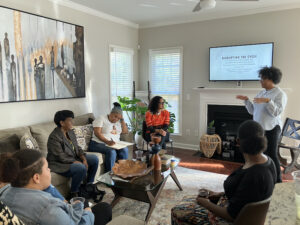About
Disrupting the Cycle of Inaccessible Healthcare and Supports for Minoritized Adults with Intellectual and Developmental Disabilities (IDD) is a health equity study funded by the Robert Wood Johnson Foundation. We bring together adults with IDD, care partners, and providers to develop a culturally affirming model of supports to address the healthcare and community needs of adults with IDD from diverse backgrounds.
Our central hypothesis is that minoritized people with IDD experience barriers, including structural racism, to accessing the healthcare system. Disrupting the Cycle has identified facilitators and barriers to equitable healthcare for people with IDD and their care partners, and has developed strategies to enhance care and support.
Research Model
 The Disrupting the Cycle team is a true partnership between UNC researchers, co-researchers, and community partners. The first phase of Disrupting the Cycle focused on the following:
The Disrupting the Cycle team is a true partnership between UNC researchers, co-researchers, and community partners. The first phase of Disrupting the Cycle focused on the following:
Understanding partners’ histories and experiences with providers.
Through group meetings, co-researchers shared narratives about their health care experiences, identifying people, places, and resources that were important to their stories. A larger narrative emerged around health and advocacy, including experiences with providers, researchers, legislators, friends, and family.
Co-researchers geographically mapped their personal health practices, health care spaces, and their own utilization of services with consideration to characteristics, context, and health behavior.
Defining health and health care priorities.
Co-researchers engaged in group dialogue around how they define health for themselves. Co-researchers elaborated how they define “health,” who they believe are important people in their lives for generating health, and how they determine health care priorities. Together, co-researchers produced a larger narrative about what is meaningful for minoritized young adults with IDD and community care supports.
Developing suggestions for community partners and providers.
As co-researchers collectively shared their experiences, they developed suggestions for community partners and health care providers. Providers attended later meetings to participate in sharing their own experiences as well as to learn from co-researchers’ experiences.
Research Findings
Numerous themes, theoretical contributions, and directions for community partners emerged from Disrupting the Cycle, including:
Discussion of these findings is available via academic publications about Disrupting the Cycle.
PublicationsNext Steps
We continue to share findings from this work through presentations and invited talks in both academic and community spaces.
We are currently developing emerging partnerships in preparation for future stages of this research. Community partners and providers interested in participating in future stages of this research are encouraged to contact us.
UNC Research Team

We come to Disrupting the Cycle as university researchers, including doctoral students, with lived experience and clinical experience working with people with disabilities from minoritized backgrounds; we are self-advocates and family advocates, practitioners with experience working with people with IDD in community settings (including practitioners who are also care partners of adult children with IDD), and a legislator with lived experience as a care partner of children with a developmental disability.
We also bring to these experiences our socializations as Black, white, cisgendered, queer, and autistic people from various socioeconomic and educational backgrounds in the continental U.S. Our lived experiences have undoubtedly informed our approach to Disrupting the Cycle as well as our personal and professional commitments to addressing equity.
Research Team